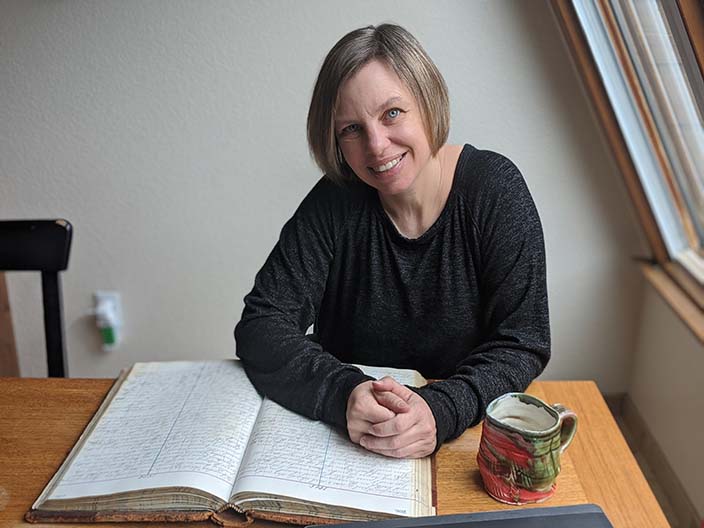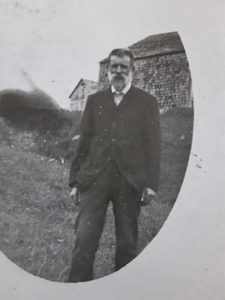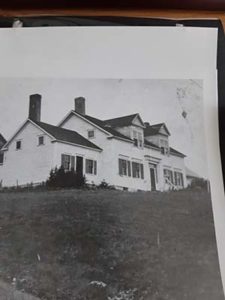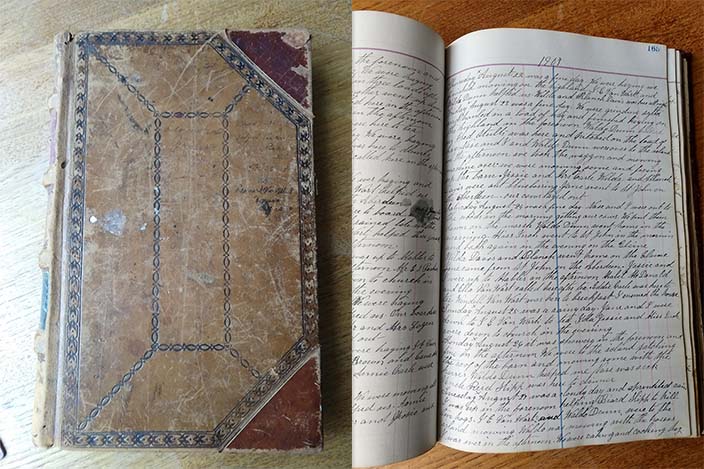
Margot sitting at her kitch table with Wilford Vanwart’s ledger.
Facing an undetermined amount of time social-distancing and trying to distract herself from the grim atmosphere found on social media, Margot Stafford, BA’95, decided to unplug and start tackling a project she had been meaning to work on for some time. No, it wasn’t cleaning the spare room, trimming the hedges, or mastering a new recipe—it was time traveling. Turns out time traveling isn’t as hard as one may think. All it takes is a family who treasures and shares heirlooms, a great-great-grandfather with a habit of tracking his daily life as a farmer in rural New Brunswick and the desire to share some light-hearted content during these troubling days.
“I know my own Twitter feed is pretty bleak these days, so I thought updates about manure hauling and log splitting might offer a refreshing alternative.”

Wilford Vanwart (Feb 8, 1849 to July 13, 1920)
Stafford came into possession of her great-great-grandfather’s farming ledger after it was handed down to her from her father. The ledger, which spans from mid-1906 to 1910, details the day-to-day life of Wilford Vanwart and his family of eight living on their homestead, Donut Hill, in Hampstead, N.B. As she sat down to begin transcribing the 114-year-old book, Stafford realized the entries were the perfect length to tweet. “I have seen the diaries and letters of dead writers such as Virginia Woolf and Jean Rhys tweeted daily. Obviously Wilford is not quite in their league, but I guess that was the inspiration. I know my own Twitter feed is pretty bleak these days, so I thought updates about manure hauling and log splitting might offer a refreshing alternative.” Her first tweet was published on March 18, 2020 and recounts how Vanwart spent March 18 in 1907.
“The solidity of his daily chores and interactions has been a welcome distraction, and it’s been fun to try and sort out who’s who and what’s what. And the positive feedback has helped make it a bright spot in sombre times.”

Wilford’s home, Donut Hill (now Strawberry Hill).
A break from the complexity of today’s troubles, the world Stafford has stepped into, bringing the rest of the Twitterverse along with her, is a welcomed change of pace for her and many others. “I don’t want to romanticize 1907 rural New Brunswick as a ‘kinder, simpler’ time but Wilford’s world seems pretty straightforward, the antithesis to what we are experiencing right now. The solidity of his daily chores and interactions has been a welcome distraction, and it’s been fun to try and sort out who’s who and what’s what. And the positive feedback has helped make it a bright spot in sombre times.” Support for this project has come from both new and familiar connections. Both the environmental history (#envhist) community on Twitter and fellow alumnae Claire Campbell, BA’95, have noticed and shared Stafford’s recounts of Vanwart’s life.

The ledger and Wilford’s beautiful penmanship.
What really stands out to Stafford as she transcribes the ledger 280 characters at a time is the sense of community and the relationships her great-great-grandfather cultivated. “It’s apparent how much people helped each other. You did your own work in the morning (or ‘forenoon’ as Wilford would say) and then helped your neighbour in the afternoon. People go a-calling, and regularly get together for meals. You didn’t just know your neighbours: you worked alongside them and socialized with them, too.”
Today, Donut Hill is known as Strawberry Hill and owned by the Irving family. After many years of teaching English, Stafford is back in school (remotely) studying to be a mental health counselor. A part-time employee at her local domestic violence shelter, she is one of the many front-line workers still going to work amidst the COVID-19 pandemic. Stafford isn’t sure how long she’ll continue this project, but finds it to be a fun hobby to work on while we all do our part to mitigate the spread of COVID-19. You can follow along with daily updates from Vanwart’s ledger on Twitter at @VanwartWillford. Stafford’s Twitter handle is @margotstafford.

